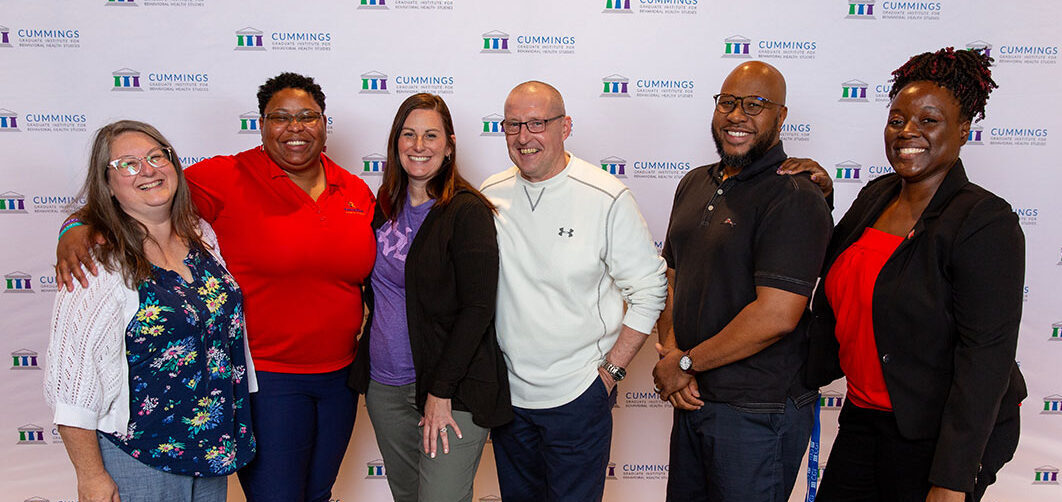Cummings Graduate Institute for Behavioral Health Studies is pleased to offer career guidance and resources to all Doctor of Behavioral Health students. Whether you aim to move into a new role, advance into a promotion, or shift careers or employers, we are here to help you prepare and leap confidently into the next level of your career.

Employment Opportunities
Job Websites for Behavioral Health & Integrated Care
Explore job postings available on the following U.S.-based behavioral health and/or integrated care-focused career links listed below.
- Mental Health America Career Center
- American Hospital Association Health Career Center
- Collaborative Family Healthcare Association Career Center
- Jobank Employment Hub for Behavioral Health Professionals and Employers
- Integrated Healthcare Association
- Veterans Health Administration: Jobs in Mental Health
Job Search Guidance
Career Advising
Cummings Graduate Institute Academic Advisors are pleased to offer career guidance to enrolled DBH students during advising appointments. To schedule a career advising session, email your advisor with the subject line “Career Advising” and include any career related questions you have in you message.
Resume/CV Review
Are you preparing to apply for a job or promotion? Cummings Graduate Institute is pleased to offer resume/CV reviews to enrolled students. To request feedback on your resume/CV, please make an appointment with the CGI Writing Center via Canvas. If feedback is needed by a specific deadline, please note the deadline in your appointment.
Self-Assessments
Understanding yourself is critical when choosing or changing your career. Being able to effectively articulate your skills, talents, and knowledge in the job search process can dramatically impact how you are perceived by potential employers.
Self-assessment tools offer insight on yourself, of which you may or may not be aware. We invite you to explore a selection of no-cost assessments for possible recommendations on how your can best describe your value and market yourself during your job hunt.
Informational Interviews
An informational interview is a meeting with a person who can help you find out more about a career or organization and potentially increase your exposure to job opportunities. Informational interviews can help you expand your network of contacts, reveal possible new career paths, and give you insight on potential employers, and confirm if job matches your own interests, skills and goals.
Informational Interviews Reference Guide
Mock Interviews
Mock interviews are a great way to ease nerves and prepare for a future interview. We suggest participating a mock interview prior to informational interviews. Cummings Graduate Institute is pleased to offer mock interviews by phone or video conference to enrolled DBH students. To request a mock interview, send an email with the subject line “Mock Interview” to your Academic Advisor. If a mock interview is needed by a specific deadline, please note the deadline in your email message. Allow 5 business days for a reply with personalized feedback.
Networking
Building a Network
Building a strong network can help you get ahead in your career in more ways than one. A health professional network can help you land a new job or aid you in finding the right talent for you team. Your personal network can also provide support to you when going through a challenging time in your life or career.
The following statistics illustrate the magnitude of networking benefits. (Statistics source: All Business)
- 70 – 80% of all jobs are found through networking
- Networking referrals will typically generate 80% more results than a cold call
- Every person you meet has 200 – 250 people with whom they connect who can potentially assist you
Cultivating a healthy, active network can afford you many professional opportunities and help you reach your goals with greater efficiency.
Your Personal Network
Have you ever mapped out your personal network? You may be surprised at how many people you know and the potential connections you have to future career opportunities. Complete this activity to explore and build your personal network.
Online Networking
As a job seeker, it can be challenging to find a job on your own. LinkedIn functions as a modern day digital version of your resume. Creating a LinkedIn profile gives you many advantages, including connections to potential future employers and easy application processes for job openings. Build your network on LinkedIn, share posts and links to topics that matter to you, and expand your connections to future opportunities.
Already have a LinkedIn profile? Be sure to your profile is up to date with your education at Cummings Graduate Institute and don’t hesitate following faculty, fellow students, and alumni.
- On LinkedIn, set CGI as your school.
- Join the CGI Alumni Group in LinkedIn (current students are welcome)
- Join the CGI Alumni Group on Facebook (current students are welcome)
Networking and Mentoring
Explore networking and mentorship opportunities through ERIC, a special interest program through the International Foundation for Integrated Care (IFIC). Linking to researchers across the globe can be an effective strategy for expanding career opportunities.
The Collaborative Family Healthcare Association also offers early career mentoring.
Informational Interviews Reference Guide
Networking at Conferences
One of the most important skills to develop as a future DBH is professional networking. Each time you attend a professional development conference, whether alone or with your current organization, you should set a goal of introducing yourself to at least 10 new people you’ve never spoken to before. Networking is a two-way street. View networking as both an opportunity to share your work and impact with others as well as to grow your knowledge of others’ work and contributions to the field so that you may call upon colleagues should you need to link others or make referrals in the future.
While this is by no means an exhaustive list, here are some of the key conferences we want you to be aware of as a student at CGI:
- International Foundation for Integrated Care Conferences & Events
- Collaborative Family Healthcare Association Conferences






























